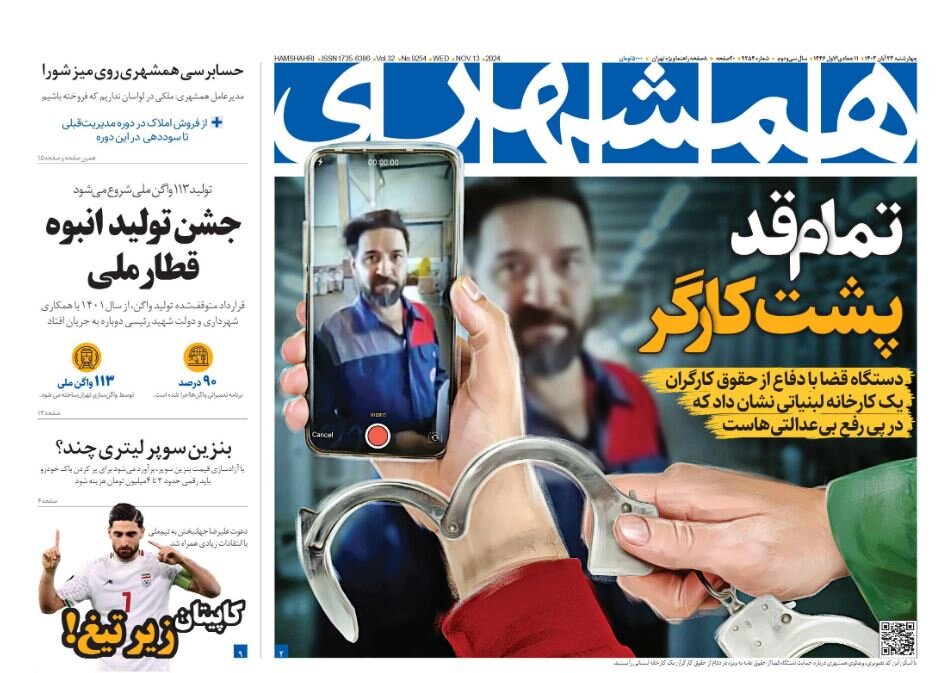What is Argentinian diplomat looking for in Iran?

TEHRAN - In a note, Hamshahri discussed the visit of International Atomic Energy Agency Director General Grossi to Tehran.
It wrote: Rafael Grossi's last trip to Tehran was in May of the current year. He intended to meet and talk with the president during that trip, but it did not happen and he made a trip to Isfahan to participate in a nuclear conference and then left Iran. Just over a month later, the Board of Governors of the International Atomic Energy Agency approved a resolution against Iran, which, according to many member countries, was more political than technical. Now, after a few months, this Argentinian diplomat is traveling to Tehran to meet with some of Iran's top officials, including the president, the minister of foreign affairs, and the head of the Atomic Energy Organization. The director general of the International Atomic Energy Agency said in a meeting that the JCPOA nuclear agreement “means nothing” because “nobody applies” or “follows” the agreement. We must try to put Iran's nuclear program back into the agreed framework; but in a newer version!
Ham Mihan: Facing America
Ham Mihan wrote Iran is involved with America bilaterally in several fields, including the nuclear issue and sanctions. Regarding the issue of Israel, due to the full support of the United States for it and Iran's support to the resistance groups, the two countries inevitably face each other. America has a large military and political presence in the Persian Gulf. Bahrain and Qatar host two main U.S. bases. Iraq can also be considered one of the points of contention between the two countries. Therefore, many conflicts of interest arise in the Persian Gulf. Due to the conflict of interests between the two countries over strategic issues, analysts believe that Iran and America should establish direct contact, not through intermediaries or messengers. Some people also believe that the two countries should not only establish direct contact but also establish a diplomatic relationship. They also say given the sharing of interests we should eventually work with the Americans. The proposal on this issue has always faced a reaction from the extremists, but the results of the analyses show that Iran needs to take this decision today. Of course, a decision in this regard should be taken by a body superior to the government.
Arman-e-Emrooz: Riyadh summit and support for Palestine
In an analysis, Arman-e-Emrooz dealt with the Arab and Islamic summit in Riyadh and said: Most of the Arab and Muslim leaders made harsher speeches against Israel in this meeting (on Nov. 12) to the extent that some Israeli media and analysts were surprised by Bin Salman's words. In his speech, the Saudi crown prince spoke strongly against “collective genocide” in Gaza and the need to stop it and again condemned the (Israeli) attack on Iran. With the full support of America and the lack of effective and collective Arab and Islamic action, Israel saw itself completely free to go on with the war and genocide. The meaning of this action was that these countries, having influential and strong lobbies in America, could prevent the deep humanitarian crisis in Gaza, but they did not. One of the important reasons was looking at this war and its fate from the viewpoint of regional conflict with Iran. The gap and tension in the region, especially in the last decade, between Iran and these countries became so deep that these actors, especially Saudi Arabia and the UAE, along with other factors, looked at the normalization and strengthening of relations with Israel as a balancing act against Iran, because they considered defeat and weakening of Israel as a reward to Iran.
Iran: Tehran's innovative diplomacy
The Islamic Republic system is taking advantage of the opportunity provided by the Pezeshkian government to develop foreign relations and the government has appeared active in this area. For example, at the height of military tension between Tehran and Tel Aviv, Foreign Minister Seyyed Abbas Araghchi implemented innovative diplomacy with Arab countries. This seems easy due to the multitude of conflicting issues and destructive extra-regional provocations. According to Reza Nasri, an expert on foreign policy issues, accelerating regional diplomacy for effective presence in new regional arrangements can help lead to the establishment of a new order as soon as possible. Therefore, this approach can act as a barrier against any possible confrontational policy in the region in the light of a possible heightened tension between Iran and America.
Leave a Comment